A will is a legal document that outlines how a person's assets and property will be distributed after death. It is an essential document ensuring that the individual's wishes are carried out, and their loved ones are cared for. Here are some of the main things that a will does: In estate planning, a will serves the purpose of identifying who will inherit an individual's assets after their death. This legal document allows individuals to specify beneficiaries, including family members, friends, charitable organizations, or other entities. Without a will, state laws will dictate how assets will be distributed, which may not align with an individual's wishes. In addition to identifying beneficiaries, a will outlines how an individual's assets will be distributed among them. This can include real estate, financial accounts, personal property, and other assets. By clearly stating how assets should be divided, a will can help prevent disputes among family members and reduce the likelihood of legal challenges. A will can also help ensure that the assets are distributed according to the individual's wishes rather than left to the discretion of the state. Naming guardians is an essential function of a will. By doing so, the individual can appoint someone they trust to care for any minor children in the event of their untimely death. The will specifies the person or persons the individual wishes to serve as the children's guardian. This provision ensures that the children will be cared for by a trusted person rather than left to the court to determine who will be responsible for them. A will can also establish trusts. Trusts are legal entities created to hold assets for the benefit of one or more beneficiaries. A trust can be used to provide ongoing financial support for beneficiaries, protect assets from creditors, and ensure that assets are used according to an individual's wishes. For example, if an individual wants to provide financial support for their grandchildren but wants to ensure the money is used for college tuition, they can create a trust with specific instructions on how the funds can be used. The trust can be managed by a trustee who oversees the trust's operations and ensures that the beneficiaries receive the benefits specified in the will. A will also allows an individual to appoint an executor responsible for managing their estate after they pass away. The executor is responsible for paying off any outstanding debts and distributing assets to beneficiaries according to the terms of the will. Without a will, the court will appoint an administrator to manage the estate, which can lead to delays and added expenses. In essence, the executor's primary task is to ensure that the beneficiaries of the will receive what is rightfully theirs. A will can provide numerous benefits for an individual and their loved ones. Here are some of the most significant benefits of having a will: With a will, you can determine who will receive your assets after you pass away. This includes tangible assets like real estate, personal property, and cash, as well as intangible assets like stocks, bonds, and intellectual property. Without a will, your assets will be distributed according to the laws of your state, which may not reflect your wishes. Family disputes can arise after a loved one passes away, particularly if there is ambiguity or disagreement about how assets should be distributed. A clear and well-drafted will can help prevent these disputes by providing a clear roadmap for distributing your assets. By taking the time to create a will and communicate your wishes to your loved ones, you can help reduce the potential for misunderstandings and conflicts. If you have minor children, a will allows you to designate a guardian to care for them in the event of your death. This can be especially important if you are single or both parents pass away simultaneously. By appointing a guardian, you can ensure that your children will be cared for by someone you trust and who shares your values. Estate taxes can be a significant burden on your heirs, potentially reducing the number of assets they receive by a substantial amount. A will can be used to structure your estate tax efficiently, potentially reducing or eliminating estate taxes altogether. This can help ensure that more of your assets are passed on to your heirs and less is lost to taxes. Having a will can provide peace of mind for yourself and your loved ones. By creating a will and communicating your wishes, you can ensure that your affairs are in order and that your loved ones will be provided for after you pass away. This can help reduce the stress and uncertainty that can arise during a difficult time, allowing you and your loved ones to focus on healing and moving forward. Not having a will can result in many unintended consequences that can significantly impact an individual's estate and their loved ones. This includes: If a person dies without a will, state distribution laws come into play. These laws dictate how the deceased person's assets will be distributed among their surviving family members. The distribution may not align with the deceased person's wishes, and some family members may be excluded from receiving any of the assets. This can lead to family conflicts and legal disputes. In the absence of a will, the court will also appoint a guardian for minor children. This means that the court will decide who will be responsible for taking care of the children in case the parents pass away. The appointed guardian may not necessarily align with the parent's wishes, leading to potential conflicts and disputes over the children's upbringing. Without a will, the process of distributing assets can be significantly delayed. The court must appoint an administrator to manage the estate and ensure that assets are distributed according to state laws. This process can take months or even years, leading to financial stress for surviving family members who may need access to those assets to cover expenses. The absence of a will can also lead to higher costs associated with managing the estate. Court-appointed administrators may charge higher fees to manage the estate, and legal fees may be incurred due to potential legal disputes among surviving family members. Not having a will can cause significant stress and financial burdens for surviving family members. It is essential to have a will to ensure one's wishes are carried out after their passing and avoid potential legal disputes and conflicts among family members. Creating a will is an essential part of estate planning, as it helps ensure that your assets are distributed according to your wishes after you pass away. Here are the steps to follow when creating a will: When creating a will, it is imperative to determine the best method. One option is a do-it-yourself online software program. These programs can be cost-effective and provide templates for creating a basic will. However, they may not be suitable for more complex situations, and they do not provide the personalized advice and guidance that an attorney can offer. The other option is hiring an estate planning attorney. An attorney can provide legal expertise and customized advice tailored to an individual's needs. They can also help with more complex estate planning needs, such as setting up trusts or minimizing tax liabilities. Identifying beneficiaries and assets is one of the most important steps in creating a will. Beneficiaries are the individuals or organizations that will receive the assets outlined in the will. It is vital to name beneficiaries for key accounts, such as life insurance policies and bank accounts, as these supersede the will. All assets should be accounted for and listed in the will, including real estate, vehicles, personal property, investments, and other assets of value. This will help ensure all assets are distributed according to the testator's wishes. The executor is the person responsible for carrying out the wishes outlined in the will. They are responsible for managing the estate assets, paying any debts or taxes owed, and distributing the assets to the named beneficiaries. When choosing an executor, it is crucial to choose someone who is trustworthy, responsible, and detail-oriented. It is also a good idea to choose someone who lives close by, as they will need to be present to handle the affairs of the estate. In addition, alternate executors should be named in case the primary executor is unable to fulfill their duties. This will help ensure that the wishes outlined in the will are carried out, even in the event of unforeseen circumstances. If there are minor children, it is important to designate a guardian in the will. This ensures that the children will be cared for by someone the testator trusts and chooses if both parents pass away. Considerations when choosing a guardian include the age, location, and suitability of potential guardians. Choosing someone financially stable and able to provide a stable and loving home for the children is crucial. It is also a good idea to name alternate guardians in case the primary guardian is unable to fulfill their duties. When creating a will, it is essential to determine how assets will be distributed among beneficiaries. This includes specifying the percentage or specific amounts of assets that each beneficiary will receive. Specific assets should be listed, and instructions on distributing them should be clear. For example, if a testator wants to leave a family heirloom to a specific family member, it should be clearly stated in the will. Specific bequests are gifts of specific items or amounts of money that are given to designated beneficiaries. These should be clearly stated in the will. Examples of specific bequests include giving a piece of jewelry to a grandchild or donating a sum of money to a favorite charity. It is important to be specific and clear when making these bequests to avoid any confusion or disputes among beneficiaries. Additionally, if a testator wants to make a specific bequest but no longer owns the asset at the time of their passing, the bequest will not be fulfilled. For a will to be legally valid, it must be signed properly. This typically involves signing the will in the presence of witnesses who are not beneficiaries. The testator must also sign the will, and the witnesses must sign to attest that they witnessed the signing. To make sure that a will is legally binding, it is crucial to comply with the particular legal regulations for signing a will in your state or jurisdiction. The original copy of the will should be stored securely to avoid it being lost, damaged, or destroyed. It is recommended to store the will in a fireproof safe or with an attorney. Additionally, a trusted individual should also know the location of the will. It is crucial to ensure that the will is easily reachable after the person who wrote it has died. If the will cannot be located, the probate court will distribute the assets according to state law, which may not align with the testator's wishes. Wills should be reviewed and updated regularly, particularly after major life events such as marriage, divorce, or childbirth. Changes should be made with the assistance of an attorney if necessary. Reviewing and updating the will can ensure that it reflects the testator's current wishes and that it remains legally valid. A will that is outdated or does not reflect the testator's current situation can lead to legal disputes or unintended consequences. While a will is an important document, it may not be enough to cover all of an individual's estate planning needs. Other estate planning documents to consider include living wills, trusts, and powers of attorney. A living will guides medical treatment in the event of incapacitation or terminal illness. Trusts can be used to transfer assets and provide for beneficiaries in a more controlled manner. Powers of attorney can authorize someone to make legal and financial decisions on the testator's behalf in the event of incapacity. A last will and testament is a crucial estate planning document that can help individuals distribute their assets and appoint guardians for their minor children. However, it is important to understand that there are some things that a will cannot do. Living trusts are different from wills because one thing that a will cannot do is leave the property in a living trust. A living trust is a legal document that allows individuals to transfer their assets into a trust during their lifetime, and the assets are managed by a trustee to benefit the beneficiaries. While a will can distribute assets, it cannot leave the property in a living trust. Another area where a will falls short is managing beneficiary designations for retirement accounts. If an individual has listed a beneficiary for their 401(k) or IRA, the assets will pass directly to the beneficiary, regardless of what is stated in the will. This means that if an individual wants to change the beneficiary for their retirement account, they must do so through the account provider, not through their will. A will also cannot be used to give funeral instructions. The reason for this is that family members may not read the will until after the funeral has taken place. Therefore, it is important to write down specific wishes for the funeral and communicate them to family members ahead of time. It is also not possible to put conditions on beneficiaries in a will. For example, an individual cannot say that they will give $10,000 to their son only if he gives up his stand-up comedy career and attends business school. Any conditions placed on a gift in a will are generally unenforceable. Finally, a will cannot be used to leave money to pets. While it is possible to name a caretaker for a pet and give them money to take care of the animal, the caretaker is not obligated to use the money as intended. Therefore, it is important to set up a trust to care for pets to ensure they are properly cared for. A will is a crucial estate planning document that outlines how a person's assets and property will be distributed after death. It identifies beneficiaries, distributes assets, names guardians, establishes trusts, and appoints an executor. Creating a will can provide numerous benefits, including control over the distribution of assets, minimizing family disputes, appointing guardians for minor children, reducing estate taxes, and providing peace of mind. On the other hand, not having a will can result in unintended consequences, such as state distribution laws, court-appointed guardianship, delayed asset distribution, and higher costs. Steps in creating a will include determining how to create it, identifying beneficiaries and assets, choosing an executor and a guardian for minor children, deciding on asset distribution and specific bequests and signing and storing the will securely. Reviewing and updating it regularly and considering additional estate planning documents are equally important. It is also crucial to note that a will cannot do everything, such as leaving the property in a living trust, managing beneficiary designations for retirement accounts, giving funeral instructions, placing conditions on beneficiaries, and leaving money to pets. Therefore, seeking the assistance of an estate planning attorney to create a comprehensive estate plan that meets an individual's unique needs and wishes is imperative. What Does a Will Do?
Identifying Beneficiaries
Distributing Assets
Naming Guardians
Establishing Trusts
Appointing an Executor
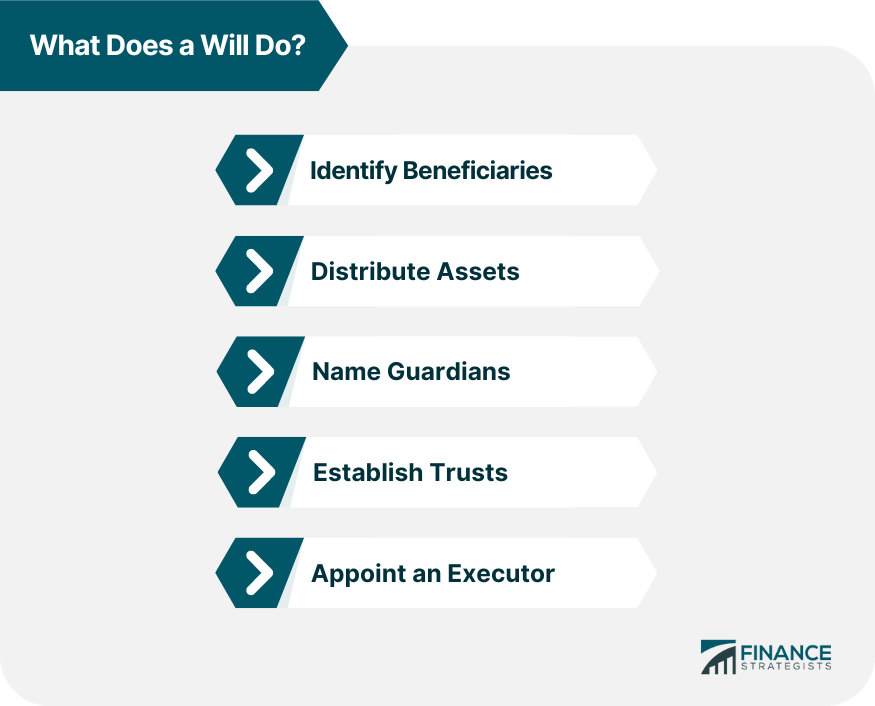
Benefits of Having a Will
Control Over the Distribution of Assets
Minimizing Family Disputes
Appointing Guardians for Minor Children
Reducing Estate Taxes
Peace of Mind
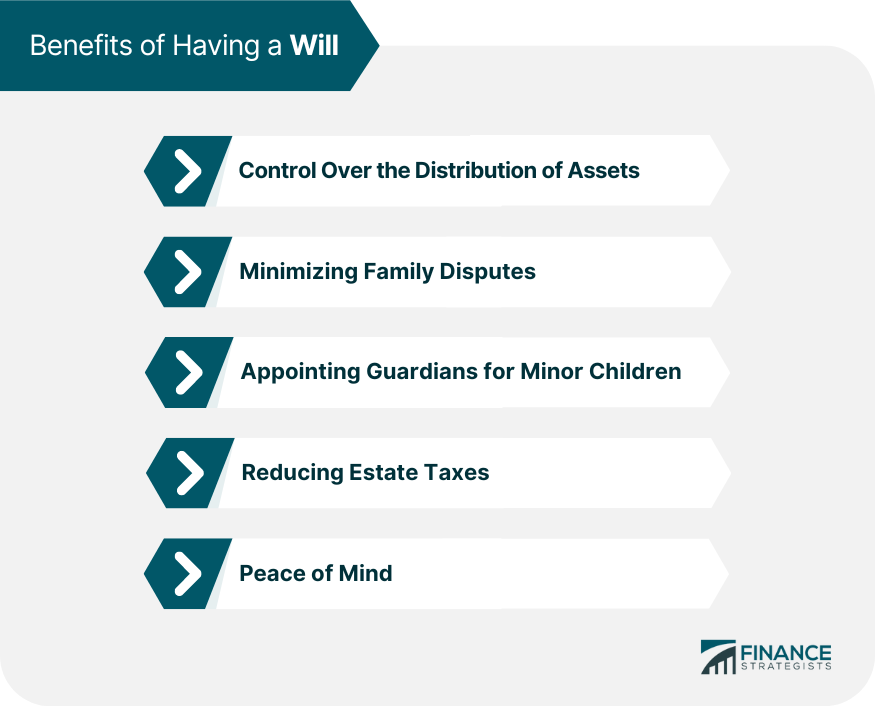
What Happens if You Do Not Have a Will
State Distribution Laws
Court-Appointed Guardianship
Delayed Asset Distribution
Higher Costs
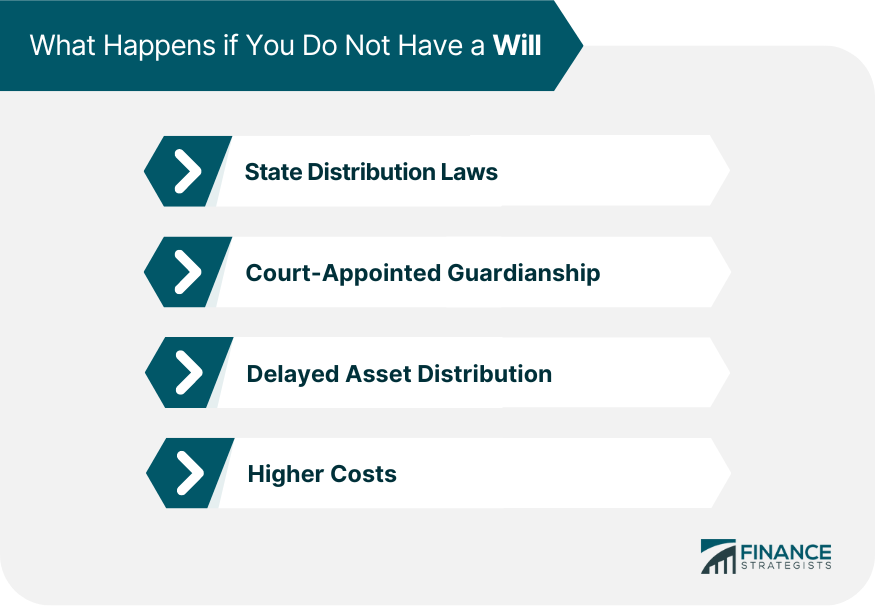
Creating a Will
Step 1: Determine the Best Way to Create a Will
Step 2: Identify Beneficiaries and Assets
Step 3: Choose an Executor and Alternate Executors
Step 4: Designate a Guardian for Minor Children
Step 5: Determine the Distribution of Assets
Step 6: Include Specific Bequests
Step 7: Sign the Will Properly
Step 8: Store the Will Securely
Step 9: Review and Update the Will Regularly
Step 10: Consider Additional Estate Planning Documents
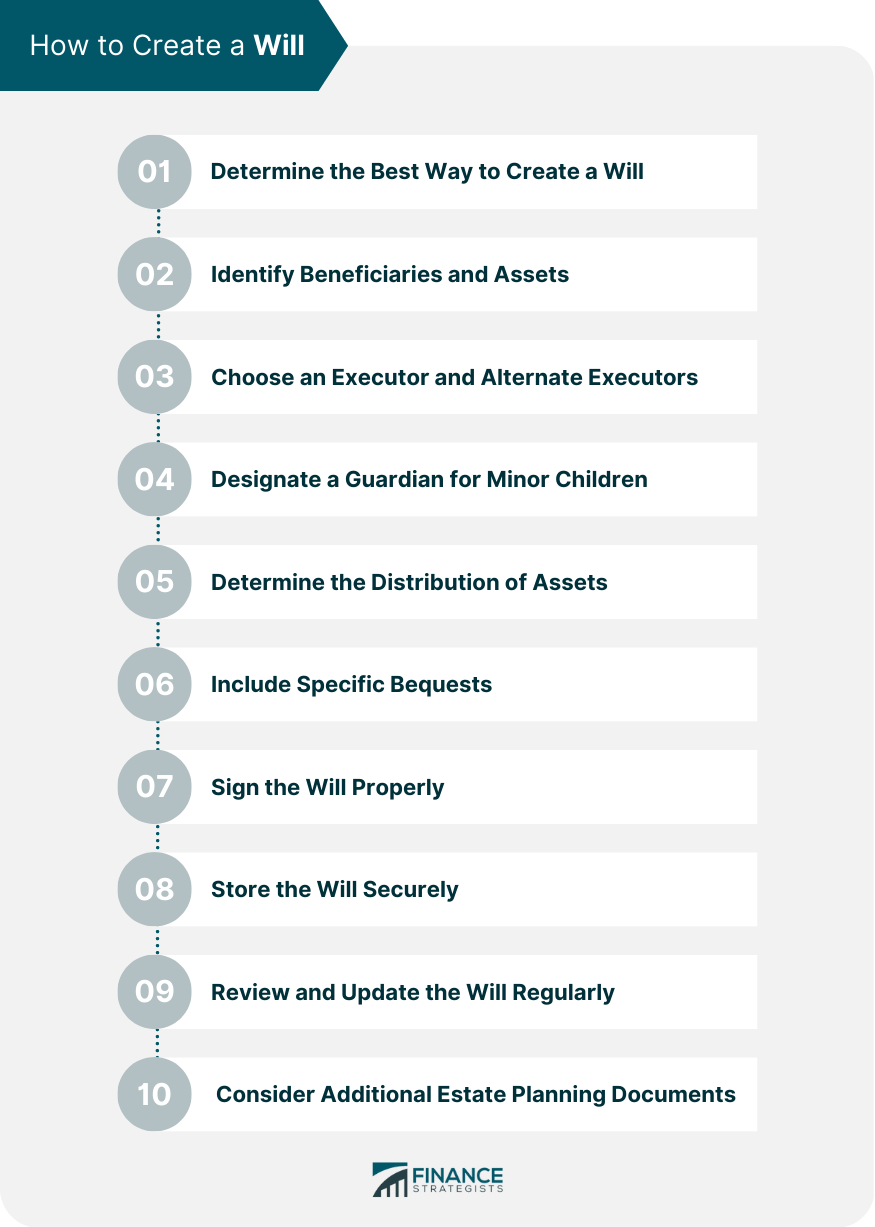
What a Will Cannot Do
Living Trusts and Wills
Beneficiary Designations for Retirement Accounts
Funeral Instructions
Conditional Bequests
Providing for Pets in Estate Planning
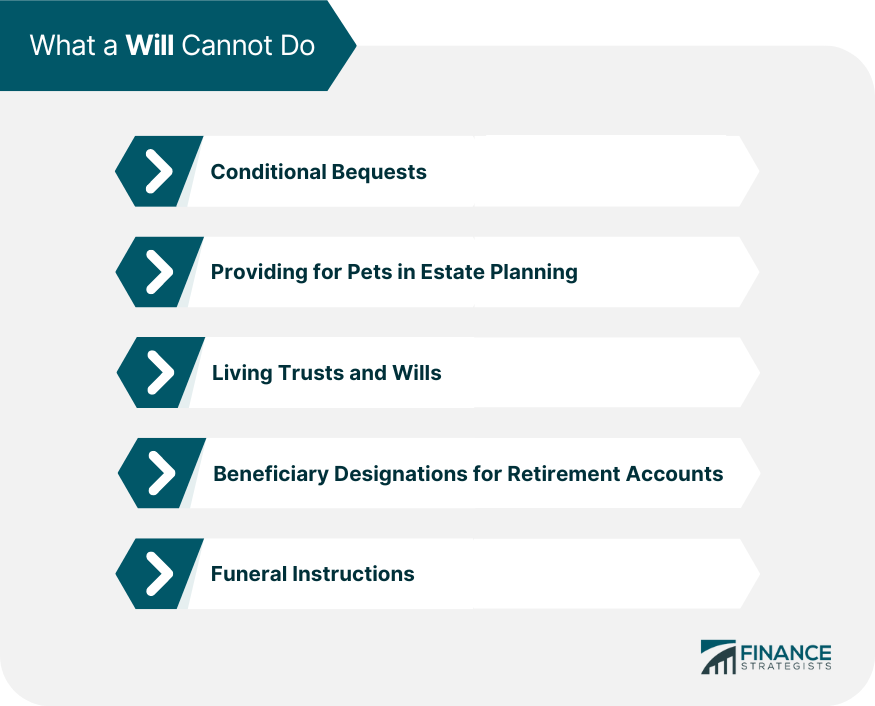
The Bottom Line
What Does a Will Do? FAQs
A will is a legal document outlining how a person's assets and property will be distributed after death. It can also appoint guardians for minor children and establish trusts for beneficiaries.
If you die without a will, state laws will dictate how your assets are distributed, and the court will appoint a guardian for your minor children. This may not align with your wishes and could cause family disputes and financial burdens.
A will can help prevent family disputes by providing a clear roadmap for distributing assets and naming guardians for minor children. You can reduce misunderstandings and conflicts by communicating your wishes to your loved ones.
You can create a will using online software programs or hire an estate planning attorney for more complex situations.
In addition to a will, you may want to consider living wills, trusts, and powers of attorney. Living wills provide guidance on medical treatment, trusts can transfer assets and provide for beneficiaries, and powers of attorney can authorize someone to make legal and financial decisions on your behalf.
True Tamplin is a published author, public speaker, CEO of UpDigital, and founder of Finance Strategists.
True is a Certified Educator in Personal Finance (CEPF®), author of The Handy Financial Ratios Guide, a member of the Society for Advancing Business Editing and Writing, contributes to his financial education site, Finance Strategists, and has spoken to various financial communities such as the CFA Institute, as well as university students like his Alma mater, Biola University, where he received a bachelor of science in business and data analytics.
To learn more about True, visit his personal website or view his author profiles on Amazon, Nasdaq and Forbes.















